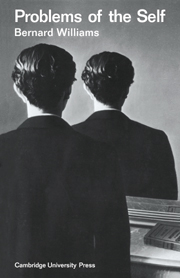Book contents
- Frontmatter
- Contents
- Dedication
- Preface
- 1 Personal identity and individuation
- 2 Bodily continuity and personal identity
- 3 Imagination and the self
- 4 The self and the future
- 5 Are persons bodies?
- 6 The Makropulos case: reflections on the tedium of immortality
- 7 Strawson on individuals
- 8 Knowledge and meaning in the philosophy of mind
- 9 Deciding to believe
- 10 Imperative inference
- 11 Ethical consistency
- 12 Consistency and realism
- 13 Morality and the emotions
- 14 The idea of equality
- 15 Egoism and altruism
- Bibliography
- Index of names
1 - Personal identity and individuation
Published online by Cambridge University Press: 07 December 2009
- Frontmatter
- Contents
- Dedication
- Preface
- 1 Personal identity and individuation
- 2 Bodily continuity and personal identity
- 3 Imagination and the self
- 4 The self and the future
- 5 Are persons bodies?
- 6 The Makropulos case: reflections on the tedium of immortality
- 7 Strawson on individuals
- 8 Knowledge and meaning in the philosophy of mind
- 9 Deciding to believe
- 10 Imperative inference
- 11 Ethical consistency
- 12 Consistency and realism
- 13 Morality and the emotions
- 14 The idea of equality
- 15 Egoism and altruism
- Bibliography
- Index of names
Summary
There is a special problem about personal identity for two reasons. The first is self-consciousness – the fact that there seems to be a peculiar sense in which a man is conscious of his own identity. This I shall consider in Section 3 of this paper. The second reason is that a question of personal identity is evidently not answered merely by deciding the identity of a certain physical body. If I am asked whether the person in front of me is the same person as one uniquely present at place a at time t, I shall not necessarily be justified in answering ‘yes’ merely because I am justified in saying that this human body is the same as that present at a at t. Identity of body is at least not a sufficient condition of personal identity, and other considerations, of personal characteristics and, above all, memory, must be invoked.
Some have held, further, that bodily identity is not a necessary condition of personal identity. This, however, is ambiguous, and yields either a weak or a strong thesis, depending on one's view of the necessity and sufficiency of the other conditions. The weaker thesis asserts merely that at least one case can be consistently constructed in which bodily identity fails, but in which the other conditions will be sufficient for an assertion of personal identity; even though there may be some other imaginable case in which, some other condition failing, bodily identity is a necessary condition of personal identity.
- Type
- Chapter
- Information
- Problems of the SelfPhilosophical Papers 1956–1972, pp. 1 - 18Publisher: Cambridge University PressPrint publication year: 1973
- 7
- Cited by



